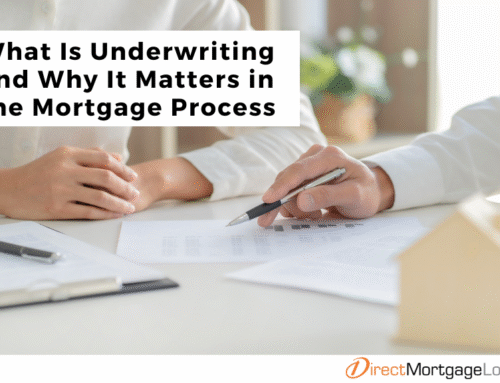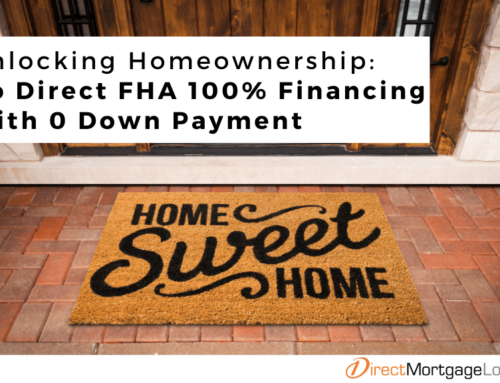If you’re planning to buy a home, you’ve likely encountered a variety of loan options. Among these, FHA and VA loans often stand out. In this article, we’ll explore the differences between these two loan types to help you determine which might be the right fit for you.
Subscribe to our blog to receive notifications of posts that interest you!
What is the difference between FHA and VA loans?
While both FHA and VA loans are government-backed mortgages, they have distinct requirements and benefits which set them apart. Let’s explore the key differences to help you determine which option you’re eligible for and best suits your needs.
Defining FHA and VA Loans
Before diving into the specifics, let’s clarify what FHA and VA loans are:
FHA Loan
An FHA loan is a mortgage insured by the Federal Housing Administration (FHA). This government-backed insurance allows lenders to offer more flexible credit and down payment requirements, making it easier for many borrowers, especially first-time homebuyers, to qualify for a home loan.
VA Loan
VA loans are designed to assist veterans, active-duty service members, and eligible surviving spouses with purchasing a home. These loans are partially guaranteed by the Department of Veterans Affairs and offer flexible terms, as well as no down payment requirement.
Eligibility
To be eligible for a VA loan, you need to be a veteran, active-duty service member, or surviving spouse, whereas FHA loans are available to the public. In addition to meeting the eligibility criteria, both loan types have further requirements, which we will discuss shortly.
Mortgage Insurance
Unlike VA loans, FHA loans require you mortgage insurance premium (MIP) for the life of the loan. MIP consists of two components: an upfront premium paid at closing and an annual premium included in your monthly mortgage payment.
The upfront premium is typically 1.75% of the loan amount, while the annual premium varies based on factors like loan term, amount, and loan-to-value ratio (LTV).
Fees and Closing Costs
While VA loans do not require mortgage insurance, there is a VA Funding fee, which helps sustain the VA loan program. The funding fee ranges anywhere from 1.25% to 3.3% of your total loan amount, depending on the size of your down payment and if it’s your first time using a VA loan.
Down Payment
One of the key differences between the two loan options is the down payment requirement. VA loans offer the benefit of no down payment, while the FHA down payment requirement depends on your credit score. If your credit score is 580 or higher, you could pay as little as 3.5% of the loan amount. However, if your credit score falls between 500 and 579, you’ll need to pay a larger down payment of 10%.
Credit Score Requirements
To qualify for an FHA loan, your FICO credit score needs to be at least 580 for a 3.5% down payment. If your credit score falls below 580, you may still qualify but will need strong compensating factors, like a lower debt-to-income ratio (DTI) or higher reserve amounts. The VA does not set a minimum credit score, but most lenders require a score of at least 580.
Mortgage Interest Rates
Your mortgage interest rate will depend on your personal situation. However, it is not uncommon for VA loans to have slightly lower interest rates compared to FHA loans.
Property Requirements
FHA and VA loans are specifically designed to help homebuyers purchase a primary residence. This means that the property you intend to buy must be the place where you plan to live permanently. The dwelling cannot be a vacation home, rental property, or investment property.
Debt-to-Income Ratio
For a VA loan, your debt-to-income (DTI) ratio should typically not exceed 41%. For FHA loans, the preferred DTI ratio is 43%, though this can vary depending on your credit score and may go up to 57%.
Loan Limits
The maximum amount you could borrow with a FHA loan is $472,030 in most areas. In high-cost areas, the limit could go up to $1,089,300 for a single-family home. Special exceptions apply in places like Alaska, Hawaii, Guam, and the U.S. Virgin Islands, where the limit is $1,633,950.
VA loan limits, on the other hand, are not fixed, and depend on your individual entitlement, which is determined by your military service history.
FHA vs VA Refinancing
When considering refinancing your FHA or VA mortgage, you have two main options, a streamline refinance and cash out refinance. Streamline refinances, like the FHA Streamline Refinance and VA Interest Rate Reduction Refinance Loan (IRRRL), are designed to simplify the refinancing process by offering a faster and more streamlined application.
On the other hand, a cash out refinance allows you to access equity in your home. This means you could borrow against the value of your property to receive a lump sum of cash. This could be helpful for various purposes, such as home improvements, debt consolidation, or funding a major purchase.
FHA Or VA loan: Which is right for you?
Choosing between an FHA and VA loan depends on your specific circumstances. If you’re a veteran or service member, a VA loan is a great option due to its competitive rates* and zero down payment requirement. However, if you’re not eligible for a VA loan, an FHA loan could still be a good choice, especially if you have a lower credit score or down payment.
*Based on average VA rates when compared to average conventional rates.
FHA vs VA Loan FAQ’s
Why are FHA and VA loans so popular?
Both FHA and VA loans are popular mortgage options due to their flexibility. They both often offer lower down payment requirements and more lenient credit score standards compared to conventional mortgages. This makes FHA and VA loans more accessible to a wider range of borrowers, including first time homebuyers and those with less-than-perfect credit.
Can I qualify for both an FHA and VA loan?
If you meet the eligibility and military service requirements, you could qualify for both an FHA and a VA loan. However, keep in mind that VA loans are exclusively for primary residences, so you’ll need to decide which loan option is the better fit for your situation.
Can I use both an FHA loan and a VA loan at the same time?
While technically there’s no rule preventing you from using both a FHA and a VA loan simultaneously, it’s not practical. Both loans are intended for purchasing a primary residence, so you wouldn’t be able to use them for different properties at the same time.
Which loan is better for first time buyers?
If you’re a first time homebuyer and meet the military service guidelines, a VA loan is likely a better option than an FHA loan. This is mainly because VA loans do not require a down payment, which could be a significant advantage for many first time buyers.
Can I refinance my FHA loan to a VA loan?
Yes, you can refinance from an FHA loan to a VA loan. For example, if you initially purchased your home with an FHA loan and later joined the military, you may be eligible to refinance into a VA loan.
Can FHA or VA loans be used for investment properties?
Both FHA and VA loans are meant for buying a primary residence, so they can’t be used to finance investment properties like rental homes or vacation properties. Since investment properties are riskier than main residences, the government has stricter rules, making FHA and VA loans not available for investment properties.






Leave A Comment
You must be logged in to post a comment.